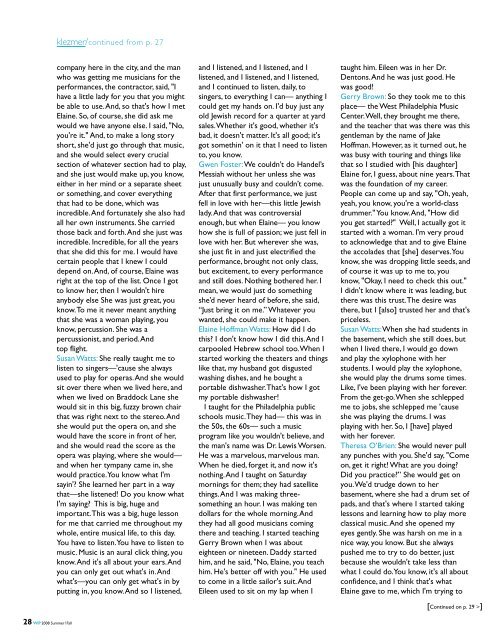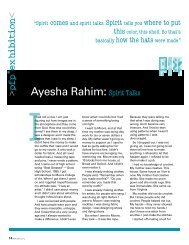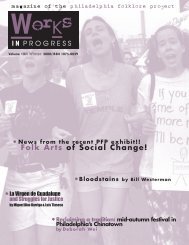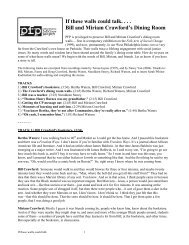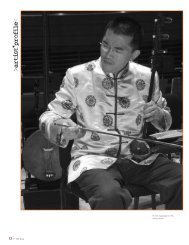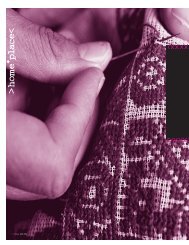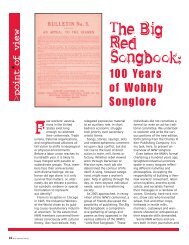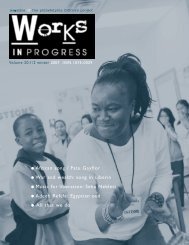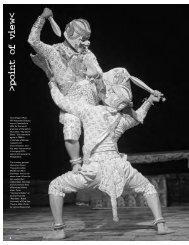View PDF - Philadelphia Folklore Project
View PDF - Philadelphia Folklore Project
View PDF - Philadelphia Folklore Project
Create successful ePaper yourself
Turn your PDF publications into a flip-book with our unique Google optimized e-Paper software.
klezmer/continued from p. 27<br />
company here in the city, and the man<br />
who was getting me musicians for the<br />
performances, the contractor, said, "I<br />
have a little lady for you that you might<br />
be able to use. And, so that's how I met<br />
Elaine. So, of course, she did ask me<br />
would we have anyone else. I said, "No,<br />
you're it." And, to make a long story<br />
short, she'd just go through that music,<br />
and she would select every crucial<br />
section of whatever section had to play,<br />
and she just would make up, you know,<br />
either in her mind or a separate sheet<br />
or something, and cover everything<br />
that had to be done, which was<br />
incredible. And fortunately she also had<br />
all her own instruments. She carried<br />
those back and forth. And she just was<br />
incredible. Incredible, for all the years<br />
that she did this for me. I would have<br />
certain people that I knew I could<br />
depend on. And, of course, Elaine was<br />
right at the top of the list. Once I got<br />
to know her, then I wouldn't hire<br />
anybody else She was just great, you<br />
know. To me it never meant anything<br />
that she was a woman playing, you<br />
know, percussion. She was a<br />
percussionist, and period. And<br />
top flight.<br />
Susan Watts: She really taught me to<br />
listen to singers—'cause she always<br />
used to play for operas. And she would<br />
sit over there when we lived here, and<br />
when we lived on Braddock Lane she<br />
would sit in this big, fuzzy brown chair<br />
that was right next to the stereo. And<br />
she would put the opera on, and she<br />
would have the score in front of her,<br />
and she would read the score as the<br />
opera was playing, where she would—<br />
and when her tympany came in, she<br />
would practice. You know what I'm<br />
sayin' She learned her part in a way<br />
that—she listened! Do you know what<br />
I'm saying This is big, huge and<br />
important. This was a big, huge lesson<br />
for me that carried me throughout my<br />
whole, entire musical life, to this day.<br />
You have to listen. You have to listen to<br />
music. Music is an aural click thing, you<br />
know. And it's all about your ears. And<br />
you can only get out what's in. And<br />
what's—you can only get what's in by<br />
putting in, you know. And so I listened,<br />
and I listened, and I listened, and I<br />
listened, and I listened, and I listened,<br />
and I continued to listen, daily, to<br />
singers, to everything I can— anything I<br />
could get my hands on. I'd buy just any<br />
old Jewish record for a quarter at yard<br />
sales. Whether it's good, whether it's<br />
bad, it doesn't matter. It's all good; it's<br />
got somethin' on it that I need to listen<br />
to, you know.<br />
Gwen Foster:We couldn’t do Handel’s<br />
Messiah without her unless she was<br />
just unusually busy and couldn’t come.<br />
After that first performance, we just<br />
fell in love with her—this little Jewish<br />
lady. And that was controversial<br />
enough, but when Elaine— you know<br />
how she is full of passion; we just fell in<br />
love with her. But wherever she was,<br />
she just fit in and just electrified the<br />
performance, brought not only class,<br />
but excitement, to every performance<br />
and still does. Nothing bothered her. I<br />
mean, we would just do something<br />
she’d never heard of before, she said,<br />
“Just bring it on me.” Whatever you<br />
wanted, she could make it happen.<br />
Elaine Hoffman Watts: How did I do<br />
this I don't know how I did this. And I<br />
carpooled Hebrew school too. When I<br />
started working the theaters and things<br />
like that, my husband got disgusted<br />
washing dishes, and he bought a<br />
portable dishwasher. That's how I got<br />
my portable dishwasher!<br />
I taught for the <strong>Philadelphia</strong> public<br />
schools music. They had— this was in<br />
the 50s, the 60s— such a music<br />
program like you wouldn't believe, and<br />
the man's name was Dr. Lewis Worsen.<br />
He was a marvelous, marvelous man.<br />
When he died, forget it, and now it's<br />
nothing. And I taught on Saturday<br />
mornings for them; they had satellite<br />
things. And I was making threesomething<br />
an hour. I was making ten<br />
dollars for the whole morning. And<br />
they had all good musicians coming<br />
there and teaching. I started teaching<br />
Gerry Brown when I was about<br />
eighteen or nineteen. Daddy started<br />
him, and he said, "No, Elaine, you teach<br />
him. He's better off with you." He used<br />
to come in a little sailor's suit. And<br />
Eileen used to sit on my lap when I<br />
taught him. Eileen was in her Dr.<br />
Dentons. And he was just good. He<br />
was good!<br />
Gerry Brown: So they took me to this<br />
place— the West <strong>Philadelphia</strong> Music<br />
Center. Well, they brought me there,<br />
and the teacher that was there was this<br />
gentleman by the name of Jake<br />
Hoffman. However, as it turned out, he<br />
was busy with touring and things like<br />
that so I studied with [his daughter]<br />
Elaine for, I guess, about nine years. That<br />
was the foundation of my career.<br />
People can come up and say, "Oh, yeah,<br />
yeah, you know, you're a world-class<br />
drummer." You know. And, "How did<br />
you get started" Well, I actually got it<br />
started with a woman. I'm very proud<br />
to acknowledge that and to give Elaine<br />
the accolades that [she] deserves. You<br />
know, she was dropping little seeds, and<br />
of course it was up to me to, you<br />
know, "Okay, I need to check this out."<br />
I didn't know where it was leading, but<br />
there was this trust. The desire was<br />
there, but I [also] trusted her and that's<br />
priceless.<br />
Susan Watts:When she had students in<br />
the basement, which she still does, but<br />
when I lived there, I would go down<br />
and play the xylophone with her<br />
students. I would play the xylophone,<br />
she would play the drums some times.<br />
Like, I've been playing with her forever.<br />
From the get-go. When she schlepped<br />
me to jobs, she schlepped me 'cause<br />
she was playing the drums. I was<br />
playing with her. So, I [have] played<br />
with her forever.<br />
Theresa O’Brien: She would never pull<br />
any punches with you. She'd say, "Come<br />
on, get it right! What are you doing<br />
Did you practice” She would get on<br />
you. We'd trudge down to her<br />
basement, where she had a drum set of<br />
pads, and that's where I started taking<br />
lessons and learning how to play more<br />
classical music. And she opened my<br />
eyes gently. She was harsh on me in a<br />
nice way, you know. But she always<br />
pushed me to try to do better, just<br />
because she wouldn't take less than<br />
what I could do. You know, it's all about<br />
confidence, and I think that's what<br />
Elaine gave to me, which I'm trying to<br />
[Continued on p. 29 >]<br />
28 WIP 2008 Summer / Fall


